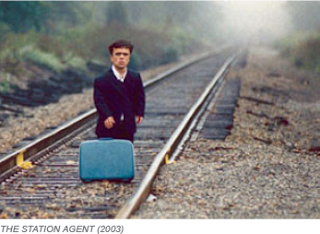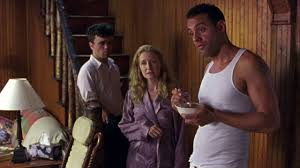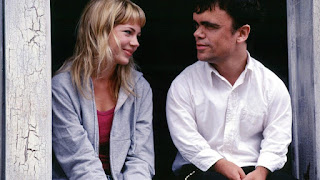SPOILER ALERT! The plot will be discussed.
The film opens with Finbar McBride (Peter Dinklage) observing a train arriving at a city station. He pulls out a pocket watch that looks like the kind used by train conductors in the past. The image immediately tells us how he is linked to trains. He is a dwarf, and IMDb notes that St. Finbar was a religious hermit born in the sixth century. He founded a monastery which, ironically, attracted many people and the place became the Irish City of Cork. Fin’s name implies that he, too, wishes to be left alone, but may not be able to escape into a fortress of solitude. At this point, his attachment to trains may show how he would like to settle down in one secure place but must keep moving to find sanctuary.
Fin works at a train shop in New Jersey owned by Henry Styles (Paul Benjamin). It is called The Golden Spike, which refers to the spot where different railroad companies joined their tracks together. It suggests connection. But, at this point, Fin is quite a loner. One can understand why he wants to avoid people since as he walks on the street boys ask him if he knows Snow White, and when he shops at the supermarket, people stare at him and giggle.Henry and Fin plan on going to a screening of a home
movie made on a train trip, but their expectations are not great, and they are
right since it is a boring presentation. There are several train enthusiasts
attending, but there is no conversation between them, so the impression is that
they are content in their oddness which brings them together, but not in a
personal way.
In a quick foreshadowing, one of the miniature figures
that Finn is painting at the train store topples over, and Henry immediately collapses
in the shop and dies. Could the tiny figure represent the upheaval that the diminutive
Fin will encounter? Fin meets with Henry’s attorney, Louis Tuboni (Richard
Kind), who says in six weeks the shop and its contents will be sold according
to Henry’s will. He left some property to Fin, which turns out to be a train
depot in a remote part of the state, where according to Tuboni, “there’s
nothing.” That may actually seem like an attractive prospect for the socially
shunning Fin. The town is called Newfoundland, and the name can indicate a
“new” start for Fin.
There is a knock at the station which is disturbing to
the hermit-like Fin, and it is Olivia bringing a bottle of bourbon as a
housewarming/apology gift. She sees Fin smoking and she says that she slept
with a guy when she was nineteen because he rolled his own cigarettes. It is an
awkward statement, injecting a sexual element here. Fin doesn’t have a phone,
adding to his desire to be off the social grid, and Olivia likes that, as she
admits she has two phones and never answers them. She notes that her former
husband gave her one of the phones, and her marital situation indicates she is also
not in a connected place in her life. She is physically awkward as she knocks
over a ticket box, symbolizing her unstable situation. She admits to losing her
son two years prior, so we understand why she is in an emotional limbo. After
revealing this fact, she wants isolation also, and tells Fin not to look at her.
She falls asleep on Fin’s couch and Fin slept in the bathtub, giving both of them their privacy. When she wakes, she feels embarrassed that she stayed overnight and runs out. Joe has met her before and suggestively jokes that she must have missed her train the prior night. Joe issues another unwanted knock on Fin’s door, gives him some coffee, and assaults him with unwanted questions about Olivia’s sleepover. He vicariously wants a connection to Olivia, and he so craves human contact, unlike Fin, that he makes Fin promise him that if he and Olivia do something later, he wants to join them. Olivia left her phone there which begins to ring. Fin finds out her address from Joe, and drops off the phone without even trying to talk with Olivia, despite having made her acquaintance. Meanwhile, Olivia is at her place painting, which also designates her as an artistic outsider, expressing herself on the canvas instead of to people. When she gets calls from her husband, she ignores them. A woman stops by and Olivia escapes, saying she has to go out. She is as evasive as Fin. They both wind up at the library, but Fin doesn’t have a library card yet. The library worker, Emily (Michelle Williams) doesn’t see his small-scale approach and is startled, dropping books on the floor, another example of how he doesn’t fit in with the expectations of others. Later, Olivia, who somehow feels safe around Fin, possibly because he is so unobtrusive, checks out the book for him and, according to Joe, leaves it at his doorstep, an attempt to make up for her overextended visit.
Cleo finally has a minimal conversation with Fin, who
she innocently thinks, because of his size, might still be going to school. She
does then ask if he’s a “midget” to which he responds, “no.” Much of his
dialogue at the beginning consists of “yes” or “no” answers reflecting his
desire to limit engaging with anyone. Some young men visit Joe’s truck and when
they see Fin come out of the station, they make derogatory comments. Joe shuts
them down and looks at them with disdain, which shows he is above their
prejudicial way of thinking.
Olivia drives past Fin who is sitting near a pond reading. When she gets coffee at Joe’s, he finds out that she passed Fin. Joe asks for a ride to see Fin. While they ride together, she gives monosyllabic responses, mimicking Fin, which shows how she is like him in her social aversion. She does not want to join them, so Joe approaches Fin by himself and finds out that Fin is train watching. However, one goes by with very few cars about ninety minutes apart. Joe, who is starving for something to do, is no satisfied with the activity. They run into Olivia coming out of a store and Joe gets the other two to join him at his truck for dinner. Fin and Olivia seem uncomfortable with the arrangement as Joe tries to morph them into his version of the Three Musketeers. It’s funny when Joe asks Fin if people like him have clubs. Probably the first thing that comes into our minds, and also in Fin’s, is that Joe is making a prejudicial remark about Fin’s height. But Joe follows it with that he means people who love trains. Unfortunately, Joe, the glue holding these three together, must leave to take care of his ailing father. Olivia gets Fin’s lack of desire for social interaction and says she is “cool” with them just eating and not talking.
Joe now becomes Fin’s walking companion as they hike along the tracks and go to the pond to watch trains. The outgoing Joe narrates as he flings stones into the water to pass the time. He engages Fin by asking about the best train routes. Olivia drops off a camera at Fin’s because he admitted he can’t be a train chaser since he doesn’t drive and has no way to photograph the vehicles. Olivia meets Cleo who is pretending she is a conductor on one of the abandoned trains there. The young girl has a track spike collection, so she, too, is drawn to the world of trains, possibly suggesting her inner desire to hit the road and escape her solitary world.
Joe, the urban outsider in this rural area, continues to try to cement the connection with Olivia and Fin. They walk the “right of way,” which Fin explains comes from the government acquiring land to develop railroad passage. Joe, though tall, is the one who is like a child looking for something to do, quite the opposite of the other two, who retreat into their passions, trains and painting. Joe even wants to just play soccer with some kids who show up at his stand, accepting anything that will keep him occupied. Olivia comments to Fin that Joe, “does enjoy life,” which can’t be said for her and Fin at this point. That feeling overwhelms Olivia and she leaves to be alone.Joe drives his truck and Fin uses the camera that
Olivia brought him so they can indulge in some train chasing. Fin actually
appears happy for the first time. Joe invites both of them to Olivia’s house so
they can screen their film. Olivia is running late and is draped only in a
towel when she lets them in, which again adds a sexual note to the encounter.
It is the first time the two men see Olivia’s paintings, which startles Joe. As
Joe cooks a meal, Fin and Olivia dip their feet in an adjacent pond, and Olivia
says she is not used to having a loud person, such as Joe, in her house, again
attesting to her state of solitude. She says that the house was a “getaway”
place, and she really used to get away, because she couldn’t stand being in her
former community where she was the “poor woman whose son died.” We now know why
Olivia has withdrawn from the world, and she feels the pain of her loss and
dislikes feeling pitied. But Fin gives us little of his backstory. When Olivia
asks why he moved there, he jokingly says to be near Joe.
Now that he has verified his address, Fin is able to
get his own library card. When he sees Emily again, she says he has a nice
chin. It is an intriguing statement and Fin shares the observation with Joe,
which shows how these two are becoming buddies. Olivia drives right past Fin
and Joe, which shows how the encounter with her husband has made her withdraw
into herself. Fin is at the grocery store when Olivia calls in an order as she
is probably not willing to even to shop. Fin says he will deliver the items as
he most likely wants to know how she is doing. But she has no interest in
seeing him and is cold as she pays him for the groceries and immediately closes
the door. Fin’s hurt is mirrored in his face as he probably feels that he
thought he was getting close to someone who has now rejected him.
Fin told the surprised Joe that he would go with him
and his dad to the local bar he was not previously willing to visit. But he is
carrying this immediate hurt concerning Olivia there with him. Emily is waiting
for her loser boyfriend Chris (Jayce Bartok) who is standing her up. He calls
and she is distraught. She confides in Fin, telling him that she is pregnant.
She was abrupt with Chris who drives over and pushes Emily around for telling
him to get lost. Fin tries to keep Chris away from Emily and then he slams Fin
into a car. Emily tells Fin to leave to protect him. Fin looks disgusted since
it seems when he tries to connect with someone all he gets is grief. He slams
the door closed to his station in anger.
Trains roar past his new home seemingly reminding him
of how life is passing him by while he is stationed, as it were, in his
predicament. The next day Joe comes by to apologize that he didn’t show up at
the bar because his father was not feeling well. Fin is now angry at all the
disappointment he has suffered by engaging with others and bluntly tells Joe
that he wants to be left alone, which is the only way he feels emotionally
safe. He wanders to the bench to watch trains go by and there is a shot there
of a father showing his two young sons how to fish. The inclusion of this image
sharpens the contrast between those that lead fulfilling average family lives
and the outcast world of Fin. Meanwhile, Olivia’s husband continues to just
reach her phone machine, as Olivia is absent even from the camera shot to
stress her isolation.
He visits Olivia’s house again. She is on the floor
and a bottle of pills is next to her. She has fallen, literally and
figuratively, just like Fin, by taking a supposedly pain-killing substance. So,
what is happening to them bonds them together. She says that David is having a
baby in his new relationship, which obviously is horrible for Olivia, as she
sees him as replacing loss with hope, which she is not capable of doing in her
life. She falls crying into Fin’s arms, and now he is there at the right time
to offer her comfort. The next scene has Fin sitting in a waiting room as a
doctor talks to Olivia. The implication is that he helped her seek counseling.
The next film is Pickpocket.



















Thank you for the review. This movie would have flown under my radar. I'm placing it on my "must-watch" list.
ReplyDelete